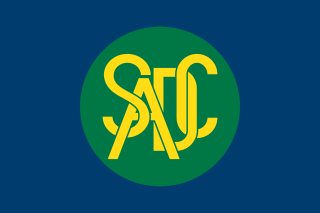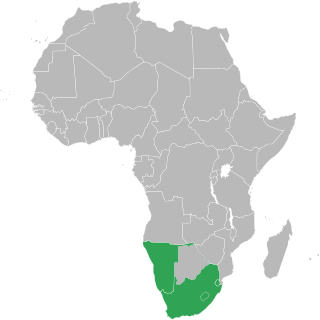Related Research Articles

The economy of Botswana is currently one of the world's fastest growing economies, averaging about 5% per annum over the past decade. Growth in private sector employment averaged about 10% per annum during the first 30 years of the country's independence. After a period of stagnation at the turn of the 21st century, Botswana's economy registered strong levels of growth, with GDP growth exceeding 6–7% targets. Botswana has been praised by the African Development Bank for sustaining one of the world's longest economic booms. Economic growth since the late 1960s has been on par with some of Asia's largest economies. The government has consistently maintained budget surpluses and has extensive foreign-exchange reserves.

The economy of Lesotho is based on agriculture, livestock, manufacturing, mining, and depends heavily on inflows of workers’ remittances and receipts from the Southern African Customs Union (SACU). Lesotho is geographically surrounded by South Africa and is economically integrated with it as well. The majority of households subsist on farming. The formal sector employment consist of mainly female workers in the apparel sector. While male migrant laborers work primarily as miners in South Africa for 3 to 9 months and employment in the Government of Lesotho (GOL). Half of the country's population work in informal crop cultivation or animal husbandry.
The economy of Eswatini is fairly diversified. Agriculture, forestry and mining account for about 13 percent of Eswatini's GDP whereas manufacturing represent 37 percent of GDP. Services – with government services in the lead – constitute the other 50 percent of GDP.

Southern Africa is the southernmost region of Africa. No definition is agreed upon, but some groupings include the United Nations geoscheme, the intergovernmental Southern African Development Community, and the physical geography definition based on the physical characteristics of the land.

The Southern African Development Community (SADC) is an inter-governmental organization headquartered in Gaborone, Botswana.

The Organisation of African, Caribbean and Pacific States is a group of countries in Africa, the Caribbean, and the Pacific that was created by the Georgetown Agreement in 1975. Formerly known as African, Caribbean and Pacific Group of States (ACP), the organisation's main objectives are sustainable development and poverty reduction within its member states, as well as their greater integration into the world's economy. All of the member states, except Cuba, are signatories to the Cotonou Agreement with the European Union.

The Southern African Customs Union (SACU) is a customs union among five countries of Southern Africa: Botswana, Eswatini, Lesotho, Namibia and South Africa. Its headquarters are in the Namibian capital, Windhoek. It was established in 1910.

The Common Monetary Area (CMA) links South Africa, Namibia, Lesotho and Eswatini into a monetary union. The Southern African Customs Union (SACU) includes all CMA members in addition to Botswana, which replaced the rand with the pula in 1976 as a means of establishing an independent monetary policy. The CMA facilitates trade and promotes economic development between its member states.
Economic Partnership Agreements (EPAs) are a scheme to create a free trade area (FTA) between the European Union and other countries. They are a response to continuing criticism that the non-reciprocal and discriminating preferential trade agreements offered by the EU are incompatible with WTO rules. The EPAs date back to the signing of the Cotonou Agreement. The EPAs with the different regions are at different states of play. The EU has signed EPAs with the following countries: the Southern African Development Community (SADC), ECOWAS, six countries in Eastern and Southern Africa, Cameroon, four Pacific states, and the CARIFORUM states. Their defining characteristic is that they open up exports to the EU immediately, while exports to the partner regions is opened up only partially and over transitioning periods.

The African Free Trade Zone (AFTZ) is a free trade zone announced at the EAC-SADC-COMESA Summit on 22 October 2008 by the heads of Southern African Development Community (SADC), the Common Market for Eastern and Southern Africa (COMESA) and the East African Community (EAC). The African Free Trade Zone is also referred to as the African Free Trade Area in some official documents and press releases.
The Southern African Regional Universities Association was established in 2005 as a membership based association for the 66 public universities in the 15 countries of the Southern African Development Community (SADC).
A customs territory is a geographic territory with uniform customs regulations and there are no internal customs or similar taxes within the territory. Customs territories may fall into several types:

Since the end of apartheid, foreign trade in South Africa has increased, following the lifting of several sanctions and boycotts which were imposed as a means of ending apartheid.

Southern African Community USA (SACU) is a registered 501(c)3 non-profit organization that was established in 2013 in the state of Maryland to promote Southern African culture and unite the Southern African Diaspora communities in the USA. It was co-founded by 10 leaders from various Southern African countries who worked together to build an organization that focused on Southern Africans living in the USA.

Government of the Kingdom of Eswatini is the union government created by the constitution of Eswatini where the monarch holds supreme executive, legislative, and judicial powers. The Ngwenyama (lion) is a hereditary leader, rules the country, with the assistance of a council of ministers and a national legislature.

The Royal Science and Technology Park (RSTP) is a Swazi public enterprise and science park created to foster the conception of inventions and facilitate their patenting and help knit various elements of the R&D cluster together. It is intended to provide a focal point for research, facilitates the links between research and industrial communities and stimulates the development of knowledge-based businesses through the incubation of techno-preneurship and high-tech enterprises.

The Trade Agreement between Southern African Customs Union (SACU) and European Free Trade Association (EFTA) is a Free trade agreement signed by both parties in 2006 in Höfn, Iceland and entered into force on 1 May 2008. It involves 9 countries: 4 are members of EFTA and 5 are members of SACU. The goal of the agreement is to deepen the relations between parties, provide favorable conditions for trade, and encourage economic integration and social development in SACU member states with support from EFTA.

Following its withdrawal from the European Union on 31 January 2020, the United Kingdom began negotiations on several free trade agreements to remove or reduce tariff and non-tariff barriers to trade, both to establish new agreements and to replace previous EU trade agreements. Withdrawal ended 47 years of membership during which all its trading agreements were negotiated by the European Commission on behalf of the bloc. The UK did not actually withdraw from the European Single Market and the European Union Customs Union until 31 December 2020.
References
- 1 2 "SACUM-UK economic partnership agreement (EPA)". GOV.UK. Retrieved 2020-02-12.
- ↑ "Southern African Development Community (SADC) - Trade - European Commission". ec.europa.eu. Retrieved 2020-02-12.
- ↑ "The transition period". GOV.UK. Retrieved 2020-02-12.
This article needs additional or more specific categories .(December 2023) |